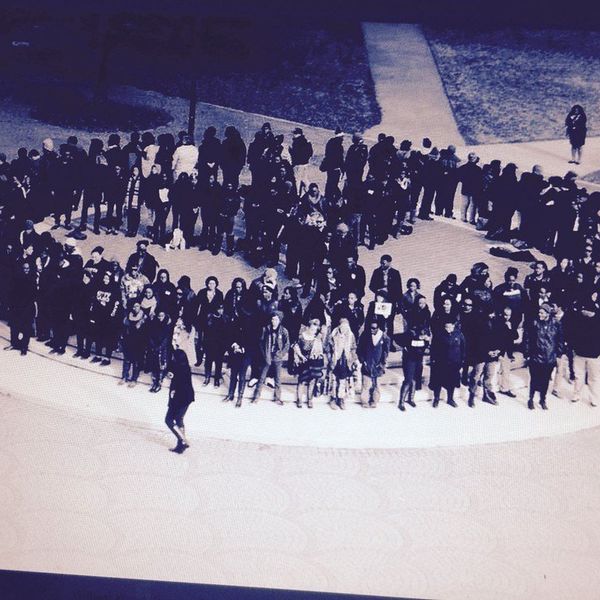I recently came across two pieces (here and here) that discuss conversations about race. I started reflecting about the way in which I approach these types of discussions. Most importantly, I realized how challenging these conversations are for people of color.
I can only imagine how difficult it is for the majority.
I used to loathe White people. I hated the way they looked down at me when I played in their parks. I hated the way they whispered, “It must be nice being Mexican” in my high school hallways after I was the only student out of seven applicants to get into Stanford. I hated the way they snickered at my parents’ attempts to speak English, as if learning a new language at 40 was a definitive test of your humanity.
Eventually, I changed. The summer before college, my friend introduced me to his cousin, a White, conservative (self-identified), 22-year-old from Minnesota. We chatted while my friend went to talk to his parents. She started telling me about her problems with her new Mercedes, to which I replied, “Why don’t you use daddy’s money to fix it, then?”
At that moment, I caught myself. I was coming from a place of hate. Understandably so, yes. But in no world did she deserve that reaction. I immediately binned her into a rigid categorization based on her race, and I came to terms with how wrong I was.
I realized that I cannot meet 99 bad people and judge the 100th in the same way. I simply cannot. Oppression is systematic, institutionalized, and unilateral. However, progressive movements should not fight this one-dimensional phenomenon with an equal and opposite reaction. Dialogue is a two-way street, and I cannot inhibit that.
But, even so, race discussions are not that black and white.
As John Metta points out, the onus of conversation leans heavily against the marginalized. “Living every single day with institutionalized racism and then having to argue its very existence, is tiring, and saddening, and angering.”
He goes on to hit a nail on the head with a very eloquent hammer: “The entire discussion of race in America centers around the protection of White feelings.”
This is the reason why conversations about race are such nuanced labyrinths. The whole dialogue is an intricate amalgam of colored pain, complex institutional interactions, White security, livelihood, and damn near every aspect of the human condition. And it will feel like we are going nowhere because of the violent collision of all these concepts.
It is discouraging and taxing. But, as an agent of change, I cannot give in to the dichotomy of an ingroup and outgroup. In a sense, White America is at fault, but what gives me the authority to blame White individuals for it?
How can I expect a White individual to trust my take on race when they have never felt the blades of discrimination? How can I expect them to shift their attention from their personal lives to the collective picture when they honestly feel that they are not contributing to the racism in America, and when they have had nothing to force them to ponder race relations? How can I expect them, both the ignorant and uninitiated, to keep up with the fervor of such powerful, polarizing and threatening experiences?
These last two paragraphs were mentally difficult to write because it feels as if I am imploring my fellow people of color to rise above their exhausting ordeals in this country. It is unfair to ask the oppressed to be extraordinary and to stand on higher ground when speaking to those who are part of the problem, be it explicit or otherwise. How can I ask marginalized individuals to remain collected when speaking on the dangers they live through everyday?
And I can see a headline somewhere that takes these words and turns them against my community, praising the peaceful hands that reach out while condemning the natural anger and frustrations of minorities.
But, in the end, that’s precisely what I am doing. Unfortunately, this is the reality we live in.
It is really, really hard for me to watch Fox News. I see a clip like this, and it leaves me ruined for the rest of the day.
Nevertheless, I’ll go out of my way to watch every once in a while. I will see Ann Coulter. And I will let myself feel rage – I am human, and I forgive myself for that. But I watch so that I can try to understand. I need to remind myself that conversations can only happen when we, the discriminated, the threatened, the ones living in danger, acknowledge that the other side is human, too. Their hand in this is not due to an inherently evil nature but to a complex circuit of relationships, impressions, and experiences that led them to the worldview they have today.
I do not believe the outgroup is intrinsically static. They are capable of understanding. Ann Coulter did not always express her current opinions. Just as we have changed, they can get there too – they are human. These are our neighbors, our coworkers, our friends; cognitive dissonance isn’t easy, and we cannot ostracize people whose conditions have guided them somewhere other than where we want them to be along the spectrum of understanding.
I will still plead with them, however. I will make sure they understand that the very lives of minorities hang on the fringe as we have our talk. There is no erasing that. And it must be understood.
Still, dialogue is a vital rung in the ladder of change. We must keep the channel open at all times and look to understand the feelings and frustrations of the voices in the conversation. Change is our calling, and it takes more than one side to make it happen.





















